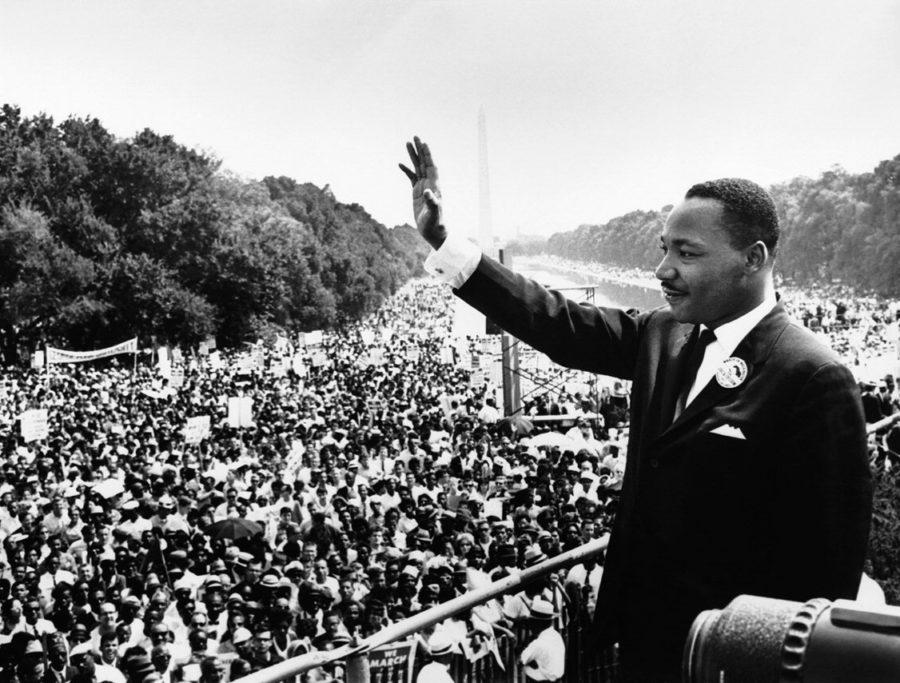The Legacy of Martin Luther King, Jr.: An Iowa State perspective
Martin Luther King Jr. addresses a crowd from the steps of the Lincoln Memorial where he delivered his famous “I Have a Dream” speech during the Aug. 28, 1963, march on Washington, D.C.
January 17, 2019
Continued activism, conversation, and recognition: these are among the themes members of the Iowa State community emphasized when discussing the legacy of Martin Luther King Jr. and the significance of his life’s work in a modern context.
King visited Iowa State in 1960 as a part of the Religion in Life week, and presented a lecture called “The Moral Changes of a New Age.” According to an article for the Ames Tribune, King spoke about the cultural transitional period the United States was beginning to experience, which attracted a crowd of roughly 1,500 people in the Great Hall of the Memorial Union.
“We stand on the threshold of the greatest era of our time in race relations,” King said in the Ames Tribune article.
Jasmine Scott, senior in industrial technology, said that King’s status as one of the main faces of the Civil Rights movement, and his commitment to nonviolent protest, stand out as significant aspects of his legacy.
Out of respect for King’s work, Scott said people could research the work of King to develop a greater understanding of his activism.
Reginald Stewart, vice president for diversity and inclusion at Iowa State, said it is also important to recognize how multifaceted King’s work was.
“We’ve historically captured King’s words and comments as really framed deeply in peaceful protest and nonviolence, and giving a tremendous amount of homage to that, but sometimes I think what we don’t want to do is take a look at the fact that Doctor King was also very strong and vocal about poverty in inner city communities, and he spoke about the Vietnam war,” Stewart said.
King’s multifaceted approach to his activism is another aspect of his legacy that Stewart said applies to modern diversity and inclusion work as well.
“As we talk about diversity, equity and inclusion, people get very fixated, that there’s one way to talk about this,” Stewart said.
Stewart said it is important to combine activism and working through systems, referencing King’s “Letter from Birmingham Jail,” which falls more closely in language to what one could characterize as activism, but also had a period of nonviolent protest and working through systems.
The relative recency of the civil rights movement and the celebration of Martin Luther King Jr. Day itself are important to take into account when discussing the progression of equality, Stewart said. The first celebration of Martin Luther King, Jr. Day was in 1986, which makes the holiday roughly 33 years old. The Civil Rights Act, passed in 1964, has been in existence for roughly 55 years.
“It is in and around Doctor King’s recognition that we openly talk about race in America; which, then, if you do the math, means we’ve really only had a real conversation about this 33 times,” Stewart said.
Continued conversations are something Stewart said are essential, but oftentimes intentional conversations about race are infrequent and limited.
“If we only allow ourselves once a year, for this twenty-four hour block to have these very real in-depth conversations about where we are as a society, and judging people by character, you can see why our progress has been so slow,” Stewart said.
While progress has been made, Stewart said it is important to recognize there is still much work to be done.
“When you really look at the central issues that had to relate to what Doctor King and his contemporaries were advocating for, [they] are almost in direct alignment with what people are asking for today,” Stewart said. “So, this concept of ‘look at how far we progressed’ I think absolutely, without question, but then we could also say, ‘Yeah, but there’s a lot of things we left on the table’.”
Stewart said he believes the celebration of King’s work and activism could become something more than the once a year marker to have intentional conversations about race.
“If Doctor King’s recognition and celebration day becomes the start of it, because it is in the beginning of the year, it’s placed perfectly for us to say, ‘This is where we’ll begin the conversation’,” Stewart said.
By recognizing and celebrating other important people and events that relate to Civil Rights activism that came after King, Stewart said a continuous, intentional conversation about race could come to fruition, beginning and ending with a recognition and celebration of King.
Scott said people could also engage in continued allyship and activism, and make their voices heard.
“Utilize what you have, if your voice will be heard before someone else’s, and you know that, and you don’t speak up, that’s where you’re in the wrong,” Scott said. “Advocate for your fellow humans.”







